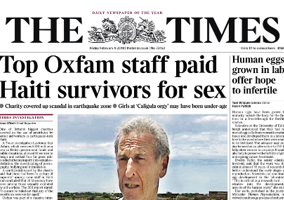Charities are failing to offer appropriate training to staff receiving and acting on whistleblowing concerns, according to a pilot report from whistleblowing charity Protect.
Twenty mid-to-large-sized charities took part in the pilot between October and January to test their whistleblowing culture.
They used Protect’s Whistleblowing Benchmark to self-assess and score themselves across governance, staff engagement, and effective operations.
The Time to Transform: Insights from Protect’s Third Sector Pilot found that more than four-fiths of the charities claimed to have a zero tolerance approach to whistleblower victimisation. But none of them monitored the risk of victimisation through any aftercare process to check the wellbeing of staff who had raised concerns.
It also found that only 52% of the charities differentiated between whistleblowing and grievances. The report states that this makes it much harder for staff to know where to go with concerns.
Of the 20 charities, 86% failed to offer whistleblowing training to staff receiving and acting on whistleblowing concerns.
'The room for improvement in the third sector is well documented'
Liz Gardiner, chief executive at Protect, said: “The room for improvement in the third sector is well documented following the Oxfam and Save the Children scandals. But in recent weeks we have once again been reminded how vital the work of charities is – and how vital speaking up about wrongdoing is to keep us all safe.
She added, “We know charities are very well aware of safeguarding, but we wanted to assess their whistleblowing culture.”
Several charities have been accused of having bullying and other safeguarding issues in recent years, and the proportion of calls to Protect's advice line coming from the charity sector has risen from 12% in 2017 to 19% in 2019.
'Generalisations cannot be made from this information alone'
Kristiana Wrixon, head of policy at ACEVO, said: “I welcome any work that is undertaken to strengthen whistleblowing processes in charities. The findings of the pilot are interesting, however the report looks at a small group of the largest charities by income, representing a tiny percentage of the sector, so generalisations cannot be made from this information alone.
“I hope that this report leads to further work that will support charities of all sizes that want to strengthen their whistleblowing practice.”
Protect says that it wants to conduct a wider scale pilot to help raise awareness amongst charities in England and Wales. It is also hoping to work more with smaller charities to help them to adopt good whistleblowing processes.
The full list of the participating charities was as follows:
- Aga Khan Foundation
- Centrepoint
- Christian Action Housing Association
- Garden House Hospice Care
- Islamic Relief Worldwide
- Leonard Cheshire
- MacIntyre
- Malaria Consortium
- Marie Curie
- Mind
- Royal Voluntary Service
- RSPB
- Save the Children UK
- Scottish Association for Mental Health
- Spurgeons
- Stonewater
- Thames Hospice
- The Children's Society
- United Response
- Wellcome Trust
Related articles











